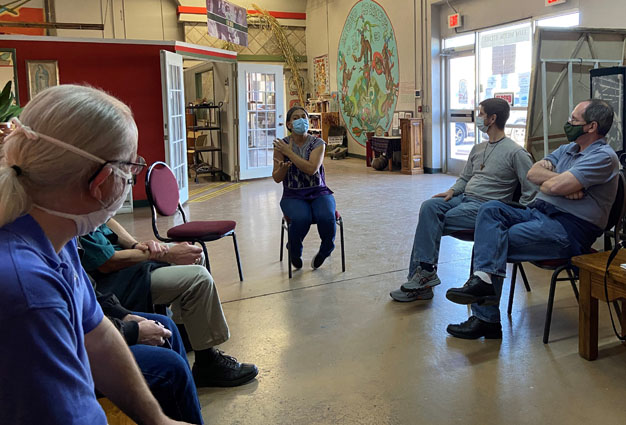 Barb Arland-Fye
Barb Arland-Fye
Deacon Frank Agnoli, left, and deacon candidates listen to Lorena Andrade, director of La Mujer Obrera (The Woman Worker), an independent organization in El Paso, Texas, that strives to equip and empower women and their families along the border to thrive.
By Barb Arland-Fye
The Catholic Messenger
(Editor’s note: This is the second in a series on a border immersion experience.)
EL PASO, Texas — Seated at a table in Café Mayapan, a group from the Diocese of Davenport passed around plates filled with traditional Mexican cuisine to share with one another. Some of them were brave enough to eat pizza that featured grasshoppers!
Café Mayapan, located in Barrio Chamizal, one of El Paso’s lowest-income districts along the U.S.-Mexico border, serves both fresh food to the public and as a training center for job and food employment. It is among the cornerstone enterprises of La Mujer Obrera (The Woman Worker), an independent organization that strives to equip and empower women and their families along the border to thrive and to have a voice in the community.
La Mujer Obrera has received funding from the Catholic Campaign for Human Development (CCHD), a collection taken annually in dioceses across the nation, including the Diocese of Davenport (this year’s collection is Nov. 20-21).
The Davenport Diocese group — deacon candidates Ryan Burchett, Kent Ferris, Andy Hardigan, Gary Johnson and Andrew Reif; their formation director, Deacon Frank Agnoli; and Bishop Thomas Zinkula — visited Café Mayapan during their border immersion experience Nov. 3-6 in El Paso and Ciudad Juarez, Mexico. The roomy building that houses Café Mayapan serves as headquarters for La Mujer Obrera.
After lunch, some of the visitors shopped in the adjacent Lummetik Trading Company, a fair trade company that sells textiles, home goods and toys crafted by indigenous women from cooperatives across Mexico who are members of the national network “Niu Matat Napawika. La Mujer Obrera launched the network to assist women in small business development and export.
Lorena Andrade, the director of La Mujer Obrera, spoke passionately and knowledgably to the Davenport Diocese group about the organization’s efforts and her assessment of the situation on the border today. Women garment workers and Chicana activists founded La Mujer Obrera in 1981 and developed its organizing strategies based on the basic human rights of employment, housing, education, nutrition, health, peace and political liberty. The independent organization “has been one of the leaders in the ‘undeclared war’ on marginalized women workers of Mexican heritage” (www.mujerobrera.org).
Today, La Mujer Obrera provides the training center for job and food employment, a daycare and learning center for children from primarily low-income families, and funding for a program that trains low-income women workers to serve as advocates for themselves and their communities on the border.
Andrade said the North American Free Trade Agreement (NAFTA) caused the loss of tens of thousands of jobs in the border region, many of them held by women with limited education. In an executive summary, the Center for Economic and Policy Research described NAFTA’s impact on Mexico:
“The very poor performance of the Mexican economy contributed to a surge in emigration to the United States. From 1994 to 2000, the annual number of Mexicans (immigrating) to the United States soared by 79 percent.”
“Those jobs are never going to come back,” Andrade said. “We were told the jobs would come but the jobs people needed didn’t come back.” Obtaining quality education to provide a better future for their children is among the big challenges Barrio Chamizal faces, she said.
“We’re trying to change the schools so kids have an opportunity to learn new ways of working. There’s a big battle with the school district,” she said. In June, La Mujer Obrera posted a letter on its website addressed to Vice President Kamala Harris. It read, in part:
“We know of your great interest in border problems. The Barrio Chamizal is in one of the lowest income neighborhoods in El Paso adjacent to the border. … Our schools in the barrio were already at the bottom in achievement even before the pandemic. Virtual education made things much worse as our community did not have the digital infrastructure and the families did not have the technology skills, with which to participate.”
“… Our school district’s plan for use of the federal (COVID-19) money for learning loss does not include the real needs of our Title 1 and English learners, which make up 95% of our community schools.” The letter writers, Familias Unidas del Chamizal (a program of La Mujer Obrera), asked Harris to visit the community so that she could better understand the situation.
Andrade said school district plans call for equal distribution of the pandemic relief money among the schools. However, she said, “Not all of the schools are the same. We deserve good schools in our community.”
She spoke to the diocesan group about the importance of building relationships — with each other, with God and with the earth. Her emphasis on interconnected relationships and creating an economy at the service of the people comes directly from Pope Francis’ 2015 encyclical “Laudato Si,” (On Care for Our Common Home). La Mujer Oberar’s leadership team read the encyclical, “which reinforces what we are doing,” she said.
Festivals and other community gatherings help build relationships, create community, and generate ideas for developing solutions to challenges, she said. “Festivals are a snapshot of what we can be when we come together,” added Andrade, a graduate of the University of Minnesota. “Our identity is our relationship with each other and with the earth and with God.”
Ferris who leads the Davenport Diocese’s Social Action office, asked Andrade how CCHD has benefitted La Mujer Obrera. “CCHD helped us start our first restaurant,” she said. “This is an incredibly wonderful opportunity to see CCHD at work,” Ferris said.











